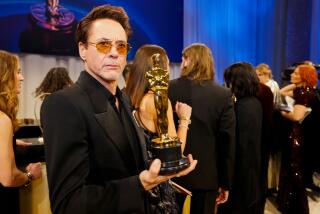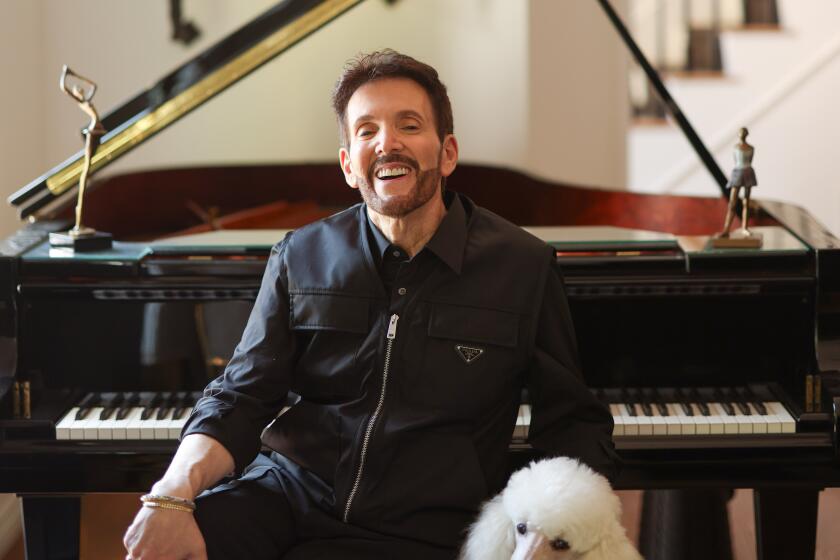PECK SEES OSCAR BACK ON PODIUM
- Share via
In every recent year the Academy Award telecast has grown longer and more tedious, the captive of time-dishonored rituals that were burying the real excitement, suspense and glamour of the night beneath interminable walk-ons and walk-offs, all-points outpourings of thanks and the dazed but pretty presences of non-film personalities uncertain how to pronounce Capra.
The appeal of the event was at risk, and so were the ratings and consequently the revenues that are the chief support of the academy’s superb library and other educational services.
“So Gene Allen, the president of the academy, called a meeting of the four of us, last October I think it was,” Gregory Peck said over an early cup of coffee at his Bel-Air home this week. “We asked ourselves, ‘What can we do to give a fresh, contemporary look to the show?’ And could we work as a quartet of producers and not come up with a camel, which is a horse designed by a committee.”
Peck, during his years as president of the academy in the mid-’60s, had led a controversial purging of the rolls to give long-inactive members non-voting status and make the organization a closer reflection of a younger industry.
He, Allen, director Robert Wise and writer Larry Gelbart made some quick decisions aimed at cutting the Monday evening show by an hour, to less than three hours.
Chief among them, to have 10 co-hosts under emcee Jack Lemmon. “They’ll be introduced as a group, at the top, and they’ll only have to be introduced and walk on once. Each of them will give two awards--one alone, one in tandem. That’s 15 awards, and it eliminates 14 intros and walk-ons.” Estimated saving: 20 minutes.
“And we’re begging and cajoling accepters to hold their remarks to 45 seconds. We won’t use a trapdoor or a hook, but we’ll start a red light flashing at the camera at 30 seconds. We timed the accumulated length of acceptances from past shows, and if we get only 70% cooperation, we’ll save another 15 or 20 minutes.”
One key decision, Peck says: to use all film people, starting at the top with host Jack Lemmon. “We weren’t going to reach out to the Celebrity Register to borrow people from other fields. The co-hosts are all from the new generation of stars, who’ve done important work in important films.”
The 10 range alphabetically from Candice Bergen and Jeff Bridges to Tom Selleck and Kathleen Turner.
There are another 17 presenters who’ll do an award each, and these embrace some of the medium’s senior superstars: Sir Laurence Olivier (who will award the best picture Oscar), Cary Grant, Gene Kelly and James Stewart. Among the others: Linda Hunt, Robert Duvall, Ann Reinking, Steve Martin and Steven Spielberg.
“With luck,” Peck says with a quick glance skyward, “there won’t be any garbled pronunciations.”
Still another policy decision: to avoid what Peck calls “the cross-collateralization of interests,” which is to say, using the recording artists themselves to perform the nomination songs. “The recording companies had come to think it was our obligation to help sell their albums. We early said we have no such obligation. With five recording artists, you no longer have a Motion Picture Academy show.”
So the production numbers will feature Diana Ross, singing Stevie Wonder’s “I Just Called to Say I Love You”; Ann Reinking doing a pas de deux with Ray Chryst on “Take a Look at Me Now,” Deniece Williams singing “Let’s Hear It for the Boy” and Debbie Allen from “Fame” performing “Footloose.” The one direct carry-over will be Ray Parker Jr. in a production number on “Ghostbusters,” which he did on the sound track.
The big non-nominated-song number is a tribute to country music and what Peck calls heartland films, sung by Willie Nelson, Kris Kristofferson and Lonette McKee.
There was one more early decision, Peck says. “It was not to harp on nostalgia. We’re not going to dwell on the past, despite the presence of four living legends. The show is of the present, contemporary, now, not a retrospective over-the-shoulder look at the good old days.”
Peck’s principal function was as a talent recruiter, and he says there were no turndowns without cause. “The standard response,” he says, “was, ‘I’ll be honored.’ ” Meryl Streep and Robert Redford are shooting in Africa, Bill Murray is working in France, Eddie Murphy appearing twice nightly at the Radio City Music Hall. They would otherwise be on hand, Peck reports.
In trying to make the show both brisker and more stylish, one real but subtle pressure has been resisted, Peck was saying. “It’s always a dichotomizing thing, altruism versus pragmatism. There’s the question of the ratings. How much of the academy’s integrity do you sacrifice for the sake of the ratings? The answer is you don’t compromise the academy for the sake of the ratings.
“There’s always pressure to take off the technical awards and others. Sure, they’re not as interesting to the wide public as the acting awards. You could do the six top awards in a half-hour show, no question about it.
“But we’re not going to downplay the editing, the writing, the makeup, the cinematography and the other components of the medium. That would have us completely dominated by TV and its demands for a climax every other minute.
“These are not unimportant awards in our minds. What we hope is that these lesser awards--as the public thinks of them--will be helped by the fact that major stars are giving them.”
The studios exert their own pressures to make the Oscar show a further promotion for the blockbusters. “The chieftains get on to us to plug their hits. Why not ‘Ghostbusters,’ why not ‘Beverly Hills Cop’? Well, they’re wonderfully entertaining films. But the academy membership isn’t riding a trendy bandwagon; it’s looking for a lot of things: technical skills, yes; characterization, yes; new themes, yes; storytelling, always.”
And that gets Peck back to his belief in the importance of the Oscar show--and the large revenue it means for the Academy of Motion Picture Arts and Sciences. “It’s what keeps the academy free and independent of the studios,” Peck says.
“I’m sticking my neck out, of course,” he adds, “talking about the style and pace and contemporary feeling the show will have. You can put a noose on my neck Tuesday morning. But this is the way we hope things will turn out Monday night.”
If Peck proves right, the thanks will be voiced on the other side of the screen for once.
More to Read
Only good movies
Get the Indie Focus newsletter, Mark Olsen's weekly guide to the world of cinema.
You may occasionally receive promotional content from the Los Angeles Times.










